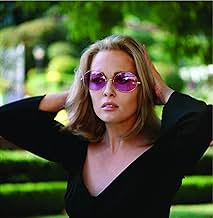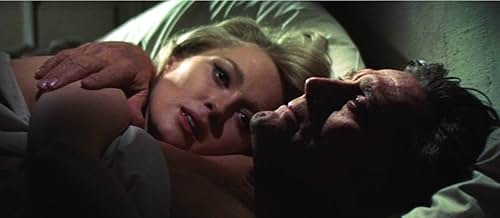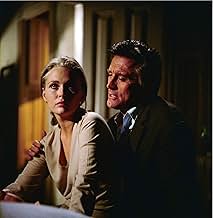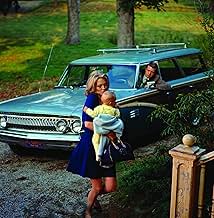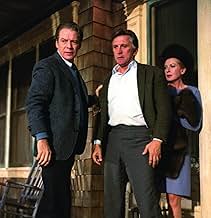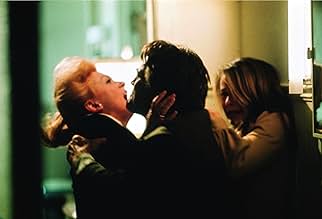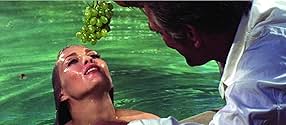VALUTAZIONE IMDb
6,3/10
3511
LA TUA VALUTAZIONE
Un pubblicitario tenta di ricostruire la sua vita in frantumi dopo aver subito un esaurimento nervoso.Un pubblicitario tenta di ricostruire la sua vita in frantumi dopo aver subito un esaurimento nervoso.Un pubblicitario tenta di ricostruire la sua vita in frantumi dopo aver subito un esaurimento nervoso.
- Premi
- 1 vittoria e 3 candidature totali
Carol Eve Rossen
- Gloria Anderson
- (as Carol Rossen)
E.J. André
- Uncle Joe
- (as E.J. Andre)
Donna Anderson
- Girl in Motel
- (non citato nei titoli originali)
Brian Andrews
- Child
- (non citato nei titoli originali)
Recensioni in evidenza
A sort of precursor to American Beauty and other modern fillms about dissatisfaction, Kazan's The Arrangment is an interesting attempt to characterize a man's deconstruction. Kirk Douglas plays Eddie, an advertising executive coming to terms with his job, his family, and his life's direction. Kazan experiments with montage, split narrative, and time span as he tells the story of a man looking for something new in life. The result is a compelling and relevant story about modern happiness that is broken apart by bizarre construction and confusing shot arrangement. Kazan has some interesting ideas here, but not all of them work. His split-consciousness portrayal of Eddie is sometimes confusing and distracting, as is the switch between past and present. Douglas is good as the lead; I don't see why Kazan would have chosen Brando in retrospect as I don't think it would have made much of a difference. Overall, a film worth seeing if you're a Kazan-freak, but otherwise stick with Streetcar, Eden, or Waterfront..
Deborah Kerr reportedly stopped doing movies after 1969 (even though she took film roles much later in life) because she no longer felt comfortable with the direction that the movie industry was going. After seeing "The Arrangement", I no longer question her sensitivity to the turbulent themes, language, and cinematography that was coming of age in the late 60's. On the surface, the film epitomizes many of the psychedelic themes of the era, from rampant flash-backs to cartoonized exclamations, such as "Bam!" and "Kerbloom!" splashing across the screen in bright neon colors. Beneath this, however, is the intensely challenging story of a man who wakes up one morning to discover that he detests the person that he has become. Kirk Douglas's Eddie Anderson will send chills up your spine as you watch him evolve from a successful advertising executive with the perfect house, the perfect job, and the perfect arrangement of both a wife and several mistresses, into a tormented, weakened man who despises himself enough to attempt suicide but believes in life enough not to carry through completely. His metamorphosis belies the chaotic style of the film; even though the erratic cinematography attempts to reflect his inner turmoil, the sense of peace that settles onto his face as the film progresses reveals that the reality of Eddie's mind is less insane than the reality of the world outside. He begins to see beyond the pretentions and fears that engulf the world around him and that had once turned him into a heartless executive,willing to convince consumers that cigarettes are good for them rather than lose a multi-million dollar client. Everyone around him, with the exception of Faye Dunaway, worships the "almighty dollar," and Eddie's release from this self-made prison allows him to make peace with himself, even as he makes enemies all around himself. Faye Dunaway is stunning and provocative as the insolent "office slut" who restores Eddie's faith in himself, ironically, by pointing out his flaws. In fact, she delivers what is possibly the most believable performance in the entire film, because her character, the strong, opinionated woman who accepts no sympathy for her decisions and weaknesses, has survived this tumultuous period much better than the character of say, the 60's housewife who desires nothing more than a maid, a swimming pool, and a wealthy husband. Deborah Kerr fills the role of Eddie's uncomprehending wife to perfection, even though anyone who has seen her in more flattering roles, as in her performance as Karen Holmes in "From Here to Eternity", won't be able to watch her portrayal of Florence Anderson without crying inwardly for the lost beauty of her earlier roles. Kerr is certainly ravishing in this film, despite the fruity-peach lipstick and the fluffy-headed hairstyle inflicted on her by the makeup department, but the uncertainty and bitterness that she plays to perfection in "The Arrangement" contrast sharply with the delicate mixture of sincerity and self-confidence that she exhibits in most of her early work. If you have not yet seen this film, make sure to read the book first. Elia Kazan's unique and personal style will illuminate the his meaning much more than any stylized cinematography could hope to. After reading the book, however, make sure to see the film, if only to admire the fine performances of the actors and to identify with the characters on a more immediate level. And, of course, just to watch the ever beautiful Deborah Kerr work her magic...
Just resaw this movie after 36 years. All I could remember from the first time I saw this film at age 11 was the car crash. Anyhow, outstanding acting by all involved. However, the movie is stolen by the powerful and emotional performance of Faye Dunaway. Miss Dunaway is stunning, both physically and emotionally. She grits her teeth and gives one of her most intense and raw performances. The film however, has a sad and depressing flip to it; the American Dream turned into a nightmare. Made in the last 1960s, to most young viewers this Elia Kazan masterpiece probably seems a weird and strange ride. However, for children of the 60s, this movie captures the "Nature of the Beast" which was 1969.
The Arrangement is outstanding.
The Arrangement is outstanding.
Some pretty big names, right at, near, or just past their peaks... kazan, douglas, dunaway, kerr, cronyn. Ed anderson is an ad man. (the irony of the "clean" cigarette campaign.) he has a midlife crisis. And of course, we flash back to what brought him to this point. Everyone wants to know what really caused it... the doctors, the therapists, coworkers, his wife. At the center of all this is gwen, the office "assistant", who doesn't have any clear duties. And now eddie wants to take care of his father, who has dementia. It's a psychological-thinker film. Izzokay. Moves pretty slowly. And gets pretty heavy. Lots of yelling. It's all well done, but i can understand why people thought it was such a downer. And so long. Keep an eye out for harold gould.. he was "miles" on golden girls. Written and directed by elia kazan. According to the trivia section, this kind of became his swan song.
Adapted by Kazan from his own novel, this ambitious if little-seen (at least in my neck of the woods) character drama emerges as an absorbing and highly personal adult piece, but one which is also pretty heavy-going and somewhat uneven in quality. Still, the director elicits excellent performances from his entire cast (with the star trio baring more than their souls in front of the cameras); Kirk Douglas is particularly impressive in one of his most interesting roles (certainly at this stage of his career, here playing the son of Richard Boone who, in real-life, is actually a year younger than Douglas!)...though Kazan, in his autobiography, seemed unhappy with having to make do with him over his first choice, Marlon Brando. It's strange that he hadn't thought of Douglas immediately to personify his alter ego on screen, since both had been immigrants and the actor would therefore have an instant connection with the character; actually, I feel that Brando's brooding intensity - as opposed to Douglas' dynamic hysterics - would have worn the film down even more than it already is...and, in any case, Marlon got to do his "mid-life crisis act" three years later in LAST TANGO IN Paris (1972)!
What is essentially an old-fashioned melodrama, particularly given the lack of young actors involved, it's brought up-to-date - and, one might say, to life - by a variety of cinematic tricks (which sometimes exasperate the spectator, as if Kazan had gone through one too many viewings of Richard Lester's strikingly similar PETULIA [1968]!): multiple flashbacks and fantasy sequences (Douglas has visions of mistress Faye Dunaway everywhere, and even has her morphing into wife Deborah Kerr during a love scene); we also get visualizations of his interior monologues in which the younger, successful Douglas straightens out his older, bitter self; and, at one point, there's even a fist-fight underscored by cartoon captions a' la the campy 1960s "Batman" TV series!! On the other hand, the film's production values - as is to be expected from a glossy studio product of its time - are tops.
Leonard Maltin strangely rates this one a BOMB in his "Movie Guide"; true, it may not be top-tier Kazan but it's nowhere near as bad as he seems to think it is. Curiously enough, I followed this viewing with the director's subsequent film, THE VISITORS (1972), also awarded the unenviable "bottom-of-the-barrel" accolade from the genial critic...though, in its case, it's a bit more understandable - as can be perceived from my own comments below!
What is essentially an old-fashioned melodrama, particularly given the lack of young actors involved, it's brought up-to-date - and, one might say, to life - by a variety of cinematic tricks (which sometimes exasperate the spectator, as if Kazan had gone through one too many viewings of Richard Lester's strikingly similar PETULIA [1968]!): multiple flashbacks and fantasy sequences (Douglas has visions of mistress Faye Dunaway everywhere, and even has her morphing into wife Deborah Kerr during a love scene); we also get visualizations of his interior monologues in which the younger, successful Douglas straightens out his older, bitter self; and, at one point, there's even a fist-fight underscored by cartoon captions a' la the campy 1960s "Batman" TV series!! On the other hand, the film's production values - as is to be expected from a glossy studio product of its time - are tops.
Leonard Maltin strangely rates this one a BOMB in his "Movie Guide"; true, it may not be top-tier Kazan but it's nowhere near as bad as he seems to think it is. Curiously enough, I followed this viewing with the director's subsequent film, THE VISITORS (1972), also awarded the unenviable "bottom-of-the-barrel" accolade from the genial critic...though, in its case, it's a bit more understandable - as can be perceived from my own comments below!
Lo sapevi?
- QuizCritics were overwhelmingly negative when the film came out, and it was the consensus that Elia Kazan should never have filmed his own best-selling novel, which was panned by most literary critics as trash when it was published in 1967. It was widely known that the lead role had been turned down by Marlon Brando, who had garnered three Academy Award nominations and was awarded one Oscar under Kazan's direction at the beginning of his film career and was the heart and soul of some of Kazan's best work as a movie director. By the late 1960s, after a string of flops, most critics felt Brando was through as a movie star and that he desperately needed Kazan to turn his career around, both as an artist and as a box-office star. When the film came out, Kirk Douglas' lead performance was roundly panned, and most critics felt that even Brando at his best couldn't save what was, in essence, a melodramatic potboiler. The failure of "The Arrangement" was the end of Kazan's own career as an A-list director.
- BlooperWhen Eddie's father eats the piece of white bread, the number of bites and placement of the bread on the tray or his belly changes between shots.
- Curiosità sui creditiExcept for the title, company logo and "A Film Written and Directed by Elia Kazan," all the remaining credits are at the end, which was still uncommon in those days.
- ConnessioniEdited into Un Américain nommé Kazan (2018)
I più visti
Accedi per valutare e creare un elenco di titoli salvati per ottenere consigli personalizzati
- How long is The Arrangement?Powered by Alexa
Dettagli
Botteghino
- Lordo in tutto il mondo
- 9536 USD
- Tempo di esecuzione
- 2h 5min(125 min)
- Mix di suoni
- Proporzioni
- 2.35 : 1
Contribuisci a questa pagina
Suggerisci una modifica o aggiungi i contenuti mancanti


